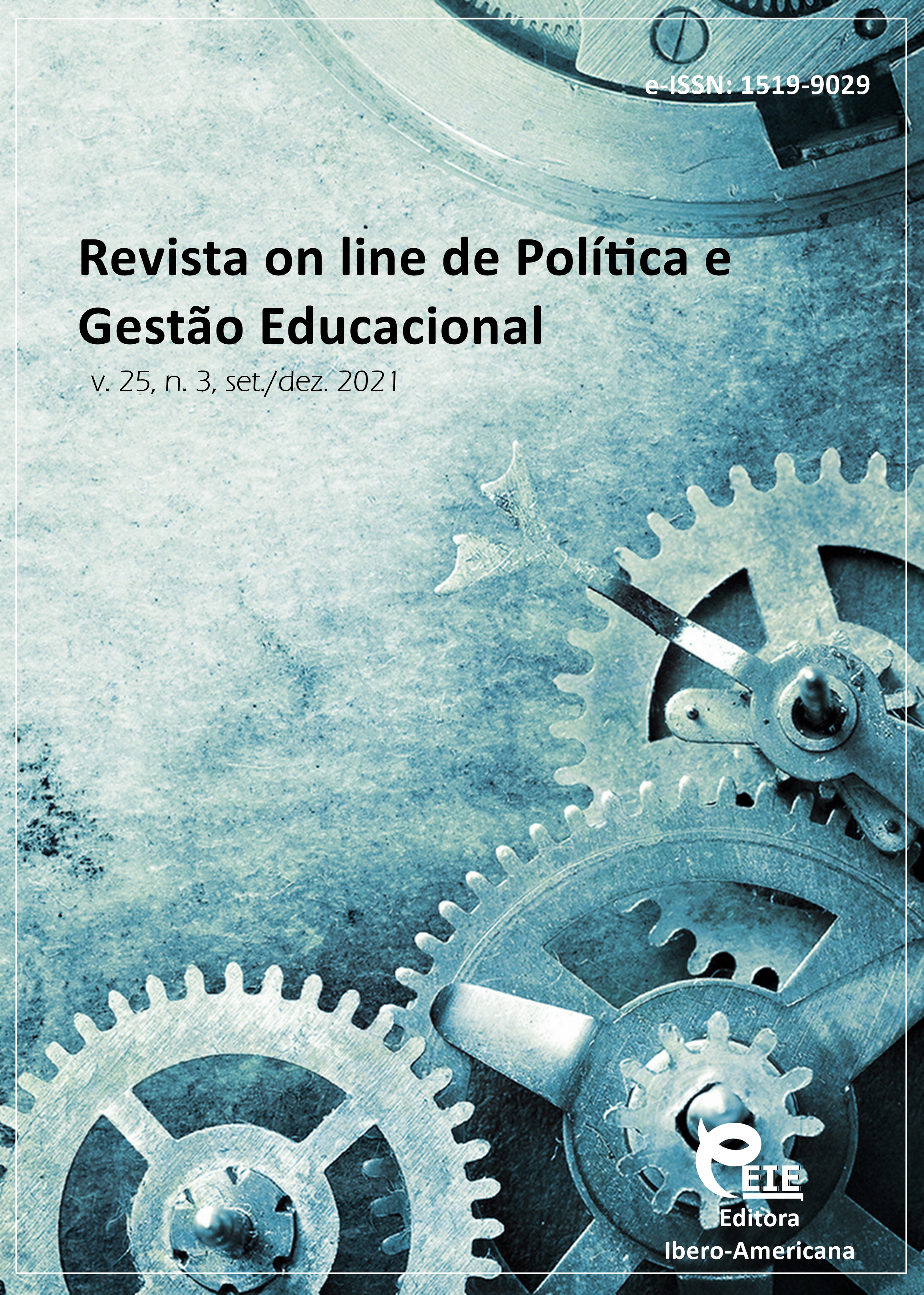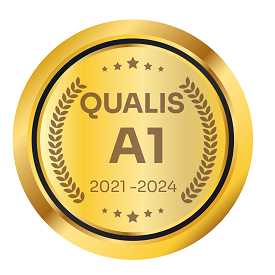El papel de la informatización de la educación en la mejora de la eficacia del proceso educativo
DOI:
https://doi.org/10.22633/rpge.v25i3.15886Palabras clave:
Informatización, Comunicación profesional, Redes sociales, Conocimiento de idiomas, ProfesiónResumen
El estudio tiene como objetivo establecer la eficacia de la informatización del proceso de aprendizaje de la lengua extranjera de la comunicación profesional y traer la viabilidad de la utilización de las redes sociales, mensajeros de la nube, las plataformas educativas en la preparación de los futuros especialistas para la comunicación profesional en un entorno de lengua extranjera. Los métodos de investigación son el método de experimento pedagógico, el método de preguntas, la observación, el método descriptivo, los métodos de síntesis y el análisis. La hipótesis principal del estudio es que la aplicación del potencial educativo de las redes sociales, las plataformas, los mensajeros, los cuestionarios es un método eficaz para formar a un especialista con un alto nivel de dominio de la lengua extranjera en el ámbito profesional. El resultado del estudio determina la eficacia del uso del proceso de informatización a nivel de la participación de las redes sociales, mensajeros para formar un alto nivel de competencia en lenguas extranjeras según la profesión.
Descargas
Citas
BRUIN, A.; TRECCANI, B.; SALA, S. Cognitive Advantage in Bilingualism An Example of Publication Bias? Psychological Science, v. 26, n. 1, p. 99–107, 2014. DOI: https://doi.org/10.1177/0956797614557866.
CAVUS, N.; IBRAHIM, D. Learning English Using Children’s Stories in Mobile Devices. British Journal of Educational Technology, v. 48, p. 625-641, 2017. DOI: https://doi.org/10.1111/bjet.12427
CHAKIR, A.; CHERGUI, M.; ANDRY, J. F. A decisional smart approach for the adoption of the IT green. Environment, Development and Sustainability, p. 1–15, 2020. DOI: https://doi.org/10.1007/s10668-020-00999-1
GILAKJANI, A. А review of EFL learners’ speaking skill and the strategies for improvement. Modern Journal of Language Teaching Methods (MJLTM), v. 6, n. 9, p. 56–63, 2016. DOI: https://doi.org/10.26655/mjltm. 2016.12.1
GOH, C. C. M.; BURNS, A. Teaching speaking: A holistic approach. New York: Cambridge, 2012. 301p.
HAPSARI, P. D.; WIRAWAN, F. The Significant Connection between Communicative Competence and Cognitive Ability in Speaking English of English Debating Team, Humaniora, v. 9, n. 2, p. 149–156, 2018. DOI: https://doi.org/10.21512/humaniora.v9i2.4492
JONES, J. F. From Silence to Talk: Cross-Cultural Ideas on Students Participation in Academic Group Discussion. English for Specific Purposes, v. 18, n. 3, p. 243–259, 1999.
KARPUSHYNA, M.; BLOSHCHYNSKYI, I.; NAKONECHNA, A.; SKYBA, K. Creating meaningful foreign language environment by means of content-based starters. Universal Journal of Educational Research, v. 7, n. 12, p. 2710–2716, 2019. DOI: https://doi.org/10.13189/ujer.2019.071219
KO, J.; SAMMONS, P.; BAKKUM, L. Effective Teaching: a review of research and evidence. CfBT Education Trust. 2013.
KÖKTÜRK, Ş. Forms and Multifunctionality of Interruptions and Simultaneous Speaking in Ordinary Talk – proposal of a Universal Model for the Evaluation of Interruptive Speech Sequences. International Journal of Linguistics, v. 4, n. 3, p. 551–571, 2012. DOI: https://doi.org/10.5296/ ijl.v4i3.2137 U
KOSTIKOVA, I. et al. Teaching English speaking for FCE: Using Facebook as a tool of instructional practice. Amazonia Investiga, v. 8, n. 22, p. 719–727, 2019.
MASON, R. Learning technologies for adult continuing education. Studies in Continuing Education, v. 28, n. 2, p. 121–133, 2006. DOI: https://doi.org/10.1080/0158 03 70600751039
NOON-URA, S. Teaching listening speaking skills to Thai students with low English proficiency. Asian EFL Journal, v. 10, n. 4, p. 173–192, 2008.
OSMANBEGOVIC, E.; SULJIC, M. Data mining approach for predicting student performance. Economic Review: Journal of Economics and Business, v. 10, n. 1, 2012.
PAN HUI. On enhancing students’ discourse competence in reading. Journal of Higher Education Reaches. 2021. DOI: https://doi.org/10.32629/ jher. v2i1.252
RABABAH, І. The Reality of Using Modern Teaching Methods in Teaching Arabic for Speakers of other Languages from Teachers’ Perspective. Journal of Social Sciences, v. 5, n. 1, p. 68–76, 2020. DOI: https:// doi.org/10.25255/jss.2020.9.1.58.94
SALGUR, S. A. The importance of the teacher in intercultural education. International Journal of Global Education, v. 2, n. 1, p. 1-5, 2013.
SCHNEIDER, K.; BERENS, J.; BURGHOFF, J. Drohende Studienabbrüche durch Frühwarnsysteme erkennen: Welche Informationen sind relevant? Zeitschrift für Erziehungswissenschaft, v. 22, n. 5, p. 1121–1146, 2019. DOI: https://doi.org/10.1007/s11618-019-00912
SICHKARENKO, K. Digital platforms: classification approaching and the role of economic development defining, Prychornomorsʹki ekonomichni studiyi, v. 35, p. 28–32, 2018.
SIM, M.; POP, A. The impact of social media on vocabulary learning: Case study Facebook. Annals of the University of Oradea. Economic Science Series, v. 23, n. 2, p. 120-130, 2014.
WANG, Y. Big opportunities and big concerns of big data in education, TechTrends, v. 60, n. 4, p. 381-384, 2016.
WILLIAMSON, B. Digital education governance: data visualization, predictive analytics and ‘real-time’ policy instruments, Journal of Education Policy, v. 31, n. 2, p. 123-141, 2016. DOI: https://doi.org/10.1080/02680 939.2015.1035758
Publicado
Cómo citar
Número
Sección
Licencia
Derechos de autor 2021 Revista on line de Política e Gestão Educacional

Esta obra está bajo una licencia internacional Creative Commons Atribución-NoComercial-CompartirIgual 4.0.
Manuscritos aceitos e publicados são de propriedade da Revista on line de Política e Gestão Educacional. É vedada a submissão integral ou parcial do manuscrito a qualquer outro periódico. A responsabilidade do conteúdo dos artigos é exclusiva dos autores. É vedada a tradução para outro idioma sem a autorização escrita do Editor ouvida a Comissão Editorial Científica.











